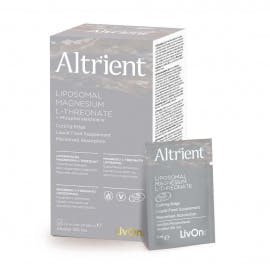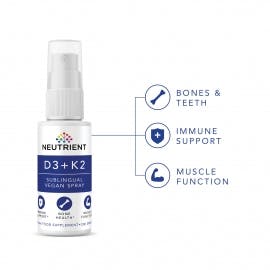Starring roles of vitamins D3 and K2 for bone support and a healthy immune system
Most of us take for granted robust health, strong bones and mobility. However, unfortunately with increasing age and possibly not enough care and attention to our lifestyle habits and dietary patterns these youthful attributes are likely to become an issue. A healthy immune system and good strong bone structure are important factors in the quest for good quality of life well into old age.
Focussing on dietary levels of vitamin D3 and vitamin K2 may help to augment the important micronutrient reserves required to help maintain the strength and wellbeing of the defence systems and skeletal structure. Vitamin D is often talked about in relation to supporting calcium levels for bone strength, yet many people are unaware as to how vitamin K fits into this picture, or how both these important micronutrients feature in immune health.
Bone health
Osteoporosis is one of the most commonly known conditions related to deteriorating bone health and affects over three million people in the UK(1). This disorder affects the strength and bone mass of the skeletal frame, which may lead to greater risks of fractures. Osteoporosis is a condition commonly talked about in relation to postmenopausal women, however, it also affects 4-6% of men over the age of 50(2).
There are many factors which could contribute to the development and progression of osteoporosis. These include:
Smoking
Inadequate nutrition
Increased age
Female gender
High alcohol intake (more than three drinks a day)
Oestrogen deficiency
Medications such as corticosteroids
Metabolic diseases such as hypothyroidism
The likelihood of fracture is related to an individual’s peak bone mass and the rate of bone loss after this peak has been reached. Genetic factors may significantly affect peak bone mass, but lifestyle factors may also contribute to bone mass. We continue to accumulate bone until the third decade of our life, when it then becomes important to find ways to maintain peak bone mass and reduce bone loss.
Paying close attention to a healthy balanced diet that includes nutrients such as calcium, vitamin D, vitamin K and protein, together with regular physical activity are particularly important for minimising the risk of bone fractures(3).
It is widely known that exercising exerts many health benefits and is also thought to contribute to the prevention of osteoporosis. The National Osteoporosis Foundation (NOF) recommends regular weight-bearing, muscle strengthening and resistive exercise such as yoga, walking and Pilates to all post-menopausal women and men over 50(4).
Whilst this type of exercise may only offer small improvements in bone loss, it has the additional benefit of helping support posture, balance, strength and co-ordination thus reducing the risks of falls.
Bone supportive nutrients
Clever marketing would have us believe that the only important nutrient associated with bone health is calcium and that the best source of calcium is milk and dairy products. Whilst calcium is most definitely required for the maintenance of normal bones, the process of bone formation requires an adequate and constant supply of various other nutrients too.
Vitamin D, vitamin K and magnesium are three nutrients that are part of the metabolic processes related to bone. Studies show that vitamin D contributes to normal absorption and utilisation of calcium and phosphorus and thus contributes to normal blood calcium levels. Vitamin K, vitamin D and magnesium are all credited for contributing to the maintenance of normal bones.
Nutritional needs of these nutrients should be met primarily from foods, however obtaining enough vitamin D from natural food sources alone is very difficult. Oily fish such as mackerel, salmon and tuna are good sources of vitamin D and small amounts can also be found in beef, liver and egg yolks. For a lot of people consuming vitamin D fortified foods, as well as being exposed to some sunlight, these activities are essential for maintaining a healthy vitamin D status.
In some groups, such as people with limited sun exposure or dark skin and individuals with conditions that may influence fat malabsorption, dietary supplements might be required to meet the recommended daily requirement for vitamin D.
A well-balanced diet should provide a plentiful supply of magnesium and vitamin K. Typical sources include:
Magnesium5
Almonds
Spinach
Cashews
Peanuts
Whole grains
Black beans
Edamame
Avocado
Natural yogurt
Vitamin K6
Natto
Collards
Spinach
Kale
Broccoli
Soybean oil
Edamame
Carrot juice
Pumpkin
Immune health
The immune system is one of the most amazingly complex systems in our body and its success depends upon an elaborate and dynamic communications network. It is vital for protecting us from all sorts of foreign invaders such as bacteria, viruses, parasites and fungi. This is achieved by galvanising an army of white blood cells which travel around the bloodstream and lymph system, fighting infection and assessing dysfunctional cells that have the potential for developing into growths such as tumours.
Understandably, there is no single magic bullet that enables such a complex system to keep functioning effectively. Instead a combination of oxygen, exercise, sunlight, adequate nutrients, water, sleep and stress management all help to support the components of the immune system to be maintained.
Important supportive nutrients
Good nutrition is a critical determinant of the immune responses in your body and even deficiencies in a single nutrient may result in an altered immune response. Malnutrition is seen as being one of the most common causes of immunodeficiency worldwide(7). Of the many micronutrients that influence immune health, vitamin D has gained considerable interest in recent years. Numerous studies have investigated the role of vitamin D in immune function and strong evidence from these demonstrates that vitamin D does indeed contribute to the normal function of the immune system(8).
In terms of immune support, a well-balanced diet should provide many of the nutrients required for a healthy immune system, however, as mentioned above gaining adequate vitamin D may be a little tricky for certain sectors of the population.
Take home message
If you’ve decided your diet may be a little lacking when it comes to the nutrients needed to support your bone health and immunity, it doesn’t hurt to top up with good quality supplements. But first, make sure you choose supplements that are well absorbed. Research shows that vitamin D3, is the most bio-available form of vitamin D(9) and vitamin K2 is considered the most biologically active form of vitamin K.
Jacqueline Newson BSc (Hons) Nutritional Therapy
REFERENCES:
https://www.nhs.uk/conditions/osteoporosis/ [Accessed 2.7.19.]
Kaufman JM, Reginster JY, Boonen S, et al. Treatment of osteoporosis in men. Bone. 2013;53(1):134-144.
27. Rizzoli R, Bianchi ML, Garabedian M, McKay HA, Moreno LA. Maximizing bone mineral mass gain during growth for the prevention of fractures in the adolescents and the elderly. Bone. 2010;46(2):294-305
Standing Committee on the Scientific Evaluation of Dietary Reference Intakes. Dietary Reference Intakes for Calcium, Phosphorus, Magnesium, Vitamin D, and Fluoride. Washington, DC: National Academy Press; 1997.
https://ods.od.nih.gov/factsheets/Magnesium-HealthProfessional/
https://ods.od.nih.gov/factsheets/vitaminK-HealthProfessional/
9. Hart K, Lambert H, Tripkovic L et al. Comparison of vitamin D2 and vitamin D3 supplementation in raising serum 25-hydroxyvitamin D status: a systematic review and meta-analysis. Am J Clin Nutr. 2012;95(6):1357-64.



.jpg?auto=format&q=45&w=262&trim=auto)
.jpg?auto=format&q=45&w=262&trim=auto)
